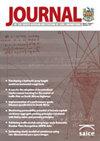增水和管理的成本效益:评估单位参考价值
IF 0.4
4区 工程技术
Q4 ENGINEERING, CIVIL
Journal of the South African Institution of Civil Engineering
Pub Date : 2020-01-01
DOI:10.17159/2309-8775/2020/v62n2a5
引用次数: 1
摘要
JAMES BLIGNAUT是一名自然和环境资源经济学家,就职于斯泰伦博斯大学公共领导学院和南非环境观测网络(SAEON)。他专注于退化景观恢复的经济学,其座右铭是:恢复经济学和恢复经济学。他特别关注再生农业的发展,并在此背景下,适当地利用和分配资源,包括恢复的经济效益。本文章由计算机程序翻译,如有差异,请以英文原文为准。
The cost-effectiveness of water augmentation and management: Assessing the Unit Reference Value
JAMES BLIGNAUT is a natural and environmental resource economist attached to both the School of Public Leadership, Stellenbosch, and the South African Environmental Observation Network (SAEON). He focuses on the economics of the restoration of degraded landscapes under the motto: The economics of restoration and the restoration of economics. He is especially focused on the advancement of regenerative agriculture and, within that context, proper resource use and allocation inclusive of the economic benefits of restoration.
求助全文
通过发布文献求助,成功后即可免费获取论文全文。
去求助
来源期刊
CiteScore
0.70
自引率
25.00%
发文量
19
审稿时长
>12 weeks
期刊介绍:
The Journal of the South African Institution of Civil Engineering publishes peer reviewed papers on all aspects of Civil Engineering relevant to Africa. It is an open access, ISI accredited journal, providing authoritative information not only on current developments, but also – through its back issues – giving access to data on established practices and the construction of existing infrastructure. It is published quarterly and is controlled by a Journal Editorial Panel.
The forerunner of the South African Institution of Civil Engineering was established in 1903 as a learned society aiming to develop technology and to share knowledge for the development of the day. The minutes of the proceedings of the then Cape Society of Civil Engineers mainly contained technical papers presented at the Society''s meetings. Since then, and throughout its long history, during which time it has undergone several name changes, the organisation has continued to publish technical papers in its monthly publication (magazine), until 1993 when it created a separate journal for the publication of technical papers.

 求助内容:
求助内容: 应助结果提醒方式:
应助结果提醒方式:


